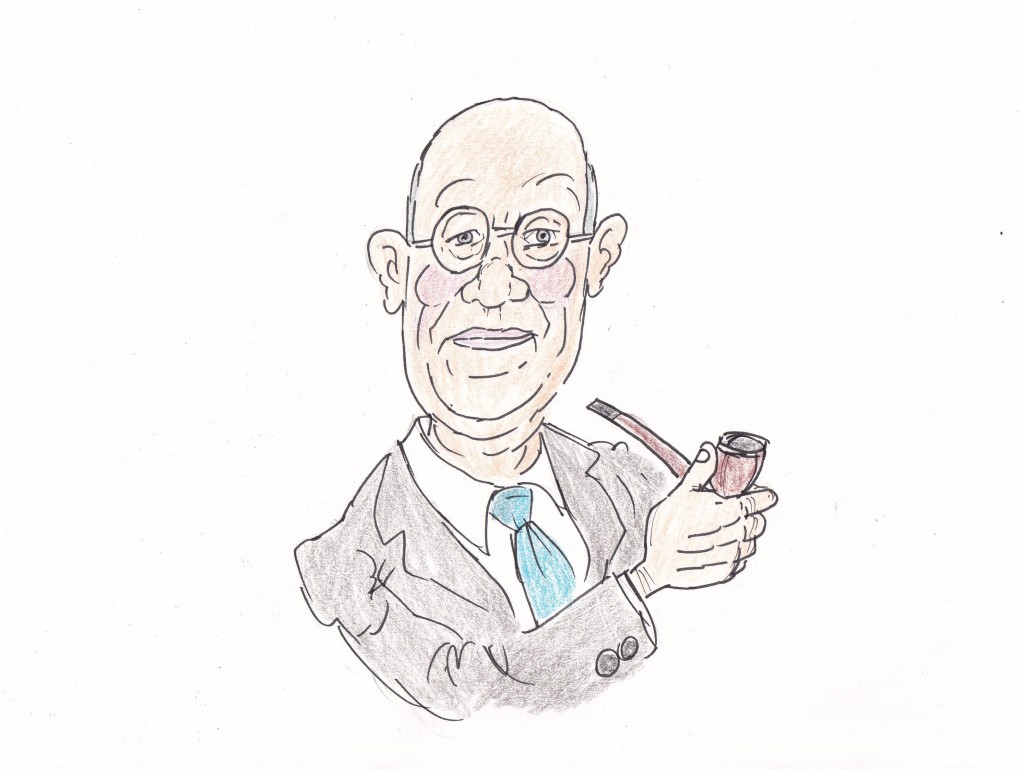What happens when Plum fans get to meet each other at a gig? Some may be known to one from the virtual world most of us inhabit these days. Others may be genial souls whom one meets for the first time, though some of them may soon assume the character of long-lost friends.
After all, Plum himself said somewhere that “There is no surer foundation for a beautiful friendship than a mutual taste in literature.” It follows that if the term “literature” here covers his own oeuvre, a high degree of bonhomie and warmth soon fills one’s bosom. The excitement of discussing his works and discovering some hereto unknown facets of his characters soon surpasses the kind of inner satisfaction Aunt Dahlia would have felt after having managed to corner the much-coveted silver cow creamer for Uncle Tom, thereby brightening the chances of ensuring a fresh lease of life to Milady’s Boudoir.
A feast of reason and flow of soul occurs. Over some browsing and sluicing, many issues get discussed. The myriad ways in which Bertie Wooster avoids many a walk down the aisle. The ethics of Rupert Psmith misleading Eve Halliday with a bunch of lies when on a boat ride in the lake at Blandings Castle. The curious case of Bingo Little who proves Charles Darwin’s Theory of Evolution wrong by undergoing a reverse metamorphosis -transforming from a butterfly during his pre-nuptial days into a caterpillar which is singularly devoted to Rosie M. Banks during his post-matrimony phase. The mystery of the disappearance of Psmith and Eve as a couple. Behavioural traits of not only the prominent loony doctors and ungentlemanly aunts but also of Batholomew, Augustus and Potato Chip come in for a detailed scrutiny.
On all such occasions, time invariably picks up speed, leaving many fans of Albert Einstein’s nodding in agreement. A duration of one hundred and twenty minutes, if spent in the enlightening company of Plum fans, sounds like a mere span of twenty minutes.
A concatenation of circumstances during the month of July 2023 led to yours truly having a couple of Plummy encounters. Here is a brief account of these.
A Mind-bending Quiz at the UK Society Meeting in London
Which breed of the canine species does Bartholomew (who, if you recall, biteth like a serpent and stingeth like an adder) belong to?!
Well, this was merely one of the twenty-five odd questions which got unleashed upon one at a recent meeting of the UK Society in London. Conducted with rare aplomb and felicity by Lasley Tapson, a committee member of the Society, the quiz helped all of us to assess the current level of our respective Pumpkin Quotients. I, for one, found mine to be higher than that of Gussie Fink-Nottle.
Besides the pleasure of meeting many other fans at the gig, I had the privilege of exchanging pleasantries with Tim Andrew, the Chairman of the Society, and Andrew Bishop, the Editor of Wooster Sauce.
Meeting a Fan from Across the Pond
It so happened that a fan of Plum’s from across the pond and yours truly were infesting the environs of London around the same time. Lia Marie Hansen, Doug, the Bingo Little of her life, and yours truly could meet for some time. Lia is a theatre professional who has worked in the past at Vanguard Lyceum Theatre and is currently a Professor at Vanguard University of Southern California.
Given her profession, the exploits of George Bevan were bound to come up for a mention. So was the fascination of Kid Blumenfeld, the dish-faced kid who, despite his tender age, controls the theatrical productions of his father, with McIntosh, Aunt Agatha’s Aberdeen terrier. Gushing references to many of Plum’s characters and instances in his narratives invariably followed. Challenges faced by the world of theatre were discussed. So were matters pertaining to advances in acoustics and a few other realms of human enterprise.
A Visit to the Dulwich College, UK
This was a lovely and instructive encounter with an important part of Plum’s life. Some of you might have already come across details of this visit of mine here.
The Orange Plums
Gangs of Plum fans, whether masquerading as societies or otherwise, can be found all over the world. Besides the United States of America, United Kingdom, Netherlands, Sweden, Norway, France, Italy, Russia, Japan, Australia, and Canada also boast of devoted fans and admirers who keep his works alive by organizing events and conducting various activities from time to time. India, with its sizeable population, also has a liberal smattering of fans, with a latent desire for some browsing and sluicing which often manifests when a fan from another city pops up.
The Wodehouse Society (USA) has many Regional Chapters all over the country. One of these, located in the Orange County of California, is known as Orange Plums. Its members congregate once every month, thereby continuing to spread sweetness and light in their community. Their meetings take place at the Streamliner Lounge and Café which happens to be a diner located on the premises of the Orange train station. The credit of introducing me to the group goes to Thomas Langston Reeves Smith, a fan of Plum’s who infests another part of the country.
To ensure that the group members did not take me to be an imposter, as also to follow Jeeves’ advice that there are no times when ties do not matter, I had worn a Drones Club tie to the meeting. This, despite the sweltering heat outside. But what I had not imagined was the kind of warmth with which the members would greet and receive me. I might as well have worn an asbestos vest. After much ‘What ho’-ing and exchange of pleasantries, I was elated to receive a few mementos from the 2022 San Diego Convention of the Wodehouse Society. Precious gifts, indeed!
All of us are aware of the invigorating properties of the juice of an orange, especially when laced with a liberal dose of tissue restoratives. However, the sheer joy of meeting some fans of Wodehouse located in a different part of the world itself acts as a powerful intoxicant on someone like me. A generally shy, morose, and reticent person like me suddenly turns into a blabbering idiot. I am surely not a loquacious pub raconteur in the same class as that of Mr. Mulliner but a transient bout of chattiness does overtake me on such occasions.
Thus, the Double-Whisky-and-Splash, the Gin-and-Tonic and the Tankard of Ale who had assembled at the venue had to suffer a great deal of coarse buffoonery on my part for close to about one hundred and twenty minutes. However, it goes to the credit of Orange Plums that they withstood the onslaught upon their auditory senses with a chin up attitude which would have made Bertie Wooster proud of them. None of them exercised either of the two options of an escape available to them – either by using their jalopies parked upfront, or by using the back door to catch the trains which were chugging along at regular intervals. Climbing down pipes was ruled out because the café happens to be on the ground floor.
Fans of Plum often hide their talents well. The Double-Whisky-and-Splash, who had coordinated the meeting, turned out to be someone who dishes out not only a monthly newsletter but also two regular submarine-related magazines. He has long studied the art of whipping up TV scripts and producers of shows are watching his progress with keen interest.
The Gin-and-Tonic, a history buff who is in the noble profession of teaching, is also open to schooling others in music appreciation and even participating in karaoke competitions. A genial soul, I am certain that her pupils would have never alluded to her as being a female lion-tamer cast in the mould of either Miss Mapleton or Miss Tomlinson.
The Tankard of Ale happens to be in the service of the Almighty, perhaps delivering Sunday sermons the durations and handicaps of which keep the local betting syndicates agog with excitement. I am sure he has had the company of a goofy kid like Thos for some time and would thus be hotter at his job. A technology geek, he kept on locating various narratives and characters on his technical gizmo, in tandem with the flow of discussion of the group, which involved trading tales and sharing our mutual enthusiasm for The Master.
It was fun meeting a few members of the group. Sometime soon, the Orange Plums are planning to organize a flowerpot throwing competition. They are also keenly looking forward to the next Society Convention, scheduled to take place in Nashville, Tennessee, September 26 – 29, 2024.
I wish Orange Plums a goofy time ahead!
A Wish List
Perhaps the Bard was not much off the mark when he said that the world is an oyster. Just in case my Guardian Angels ever enable another visit either to the United Kingdom or to the southern parts of California, my travel plans may include the various spots said to be the inspiration of many of Plum’s narratives.
By way of an example, I believe that there are two claimants to the Drones Club – the Buck’s Club in London and the Montecito Country Club at Santa Barbara. As to Totleigh Towers, the Hearst Castle at San Simeon, where Plum is said to have stayed for several months during 1930, is said to be the inspiration.
Of course, brainy coves on both sides of the pond would have already listed out several such attractions.
Each encounter of a Plummy kind leaves one feeling enthused about the future of humanity.
May the epidemic of Wodehousitis continue to spread all over the world!
Related Posts:
















